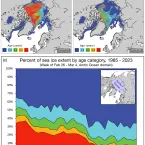
Sea Ice Today
Analyses

After declining at a near-average pace for much of the summer, Arctic sea ice loss accelerated during early August.
While large parts of the world saw record breaking heat in July, and Antarctic sea ice extent remained at record daily lows as assessed over the satellite record, Arctic sea ice extent for July was only the twelfth lowest in the satellite record.

Arctic sea ice continues to decline at a near-average pace, with ice extent twelfth lowest in the satellite record at this time.

The longest day of summer has come and gone, and summer melt is in full swing, with the pace of ice loss overall about average for this time of year. Arctic sea ice extent for June was not exceptionally low compared to other recent years.

The seasonal decline in Arctic sea ice extent was moderate through much of May before picking up pace over the last few days of the month.

The rate of sea ice loss for April 2023 was slow, owing to cool conditions across the ice-covered Arctic Ocean and below-average to near-average temperatures near the ice edge.

Sunlight has returned to the highest latitudes in the Arctic, while in the Antarctic autumn is settling in.

Arctic sea ice has likely reached its maximum extent for the year, at 14.62 million square kilometers (5.64 million square miles) on March 6.
Throughout February, Arctic sea ice extent tracked between second and fourth lowest in the satellite record while Antarctic sea ice extent tracked at record low extents.
On February 21, Antarctic sea ice likely reached its annual minimum extent of 1.79 million square kilometers (691,000 square miles).
Antarctic sea ice extent appears to have broken the record low set last year. With a couple more weeks likely left in the melt season, the extent is expected to drop further before reaching its annual minimum.
Arctic sea ice extent rose at a slower than average rate through January, and continued to be below the lower interdecile range. By the end of the month, sea ice reached the second lowest extent in the satellite record.
Daily extent of Arctic sea ice for December 2022 remained well below average for the entire month; at the end of the month, extent stood at fourth lowest in the satellite record.
November’s rate of sea ice growth in the Arctic was near average. Several of the peripheral seas have open water areas late into the autumn season. Warm air temperatures persist in the northern North Atlantic and northwestern Europe.
After reaching the minimum on September 18, Arctic sea ice extent has been steadily increasing. With the passage of the equinox, the sun has set at the North Pole.
On September 18, Arctic sea ice likely reached its annual minimum extent of 4.67 million square kilometers (1.80 million square miles).
The sun is about to set for the winter at the North Pole, and so the 2022 sea ice melt season is coming to an end.
Summer in the Arctic is drawing to a close, and sea ice extent is likely to remain higher than in recent years. Several polynyas have formed poleward of 85 degrees North within the pack as well as areas near the thin ice edge.
As the sun dips lower on the horizon, air temperatures over the central Arctic Ocean are dropping to near freezing conditions.